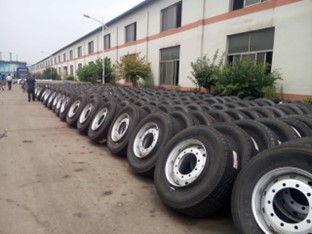Several Guangrao tyre companies have stopped or limited production
 (Photo: Xuda Wang)
(Photo: Xuda Wang)
Guangrao County in Dongying City seems to have gone silent in a short period.
On October 20, Guangrao detected an asymptomatic case of Covid-19. Then things seemed to get serious. Data from the Dongying Municipal Health Commission showed that from the 22 to the 30, new asymptomatic patients of Covid-19 were found in Guangrao daily. The government launched a response policy in a short time. According to Guangrao residents, since the 23, some communities have asked people to stay at home, and some factories require closed-loop management.
The impact also affected other areas in Dongying City. A middle-level leader of a large tyre company in Kenli District, Dongying City, told Tyrepress: “At 10:00 p.m. on October 23, I received a notice asking employees to return to the factory as soon as possible. At 8:00 the next morning, the factory will implement closed-loop management.” He was asked to self-quarantine after returning to Kenli because he had been to Guangrao before October 23.
Several tyre companies stop or limit production
As a well-known tyre manufacturing centre in China, the factories of Huasheng Rubber, Fangxing, Sailun, Xingyuan, Yongsheng, Hengfeng and other large tyre enterprises are all located in Guangrao County. According to public reports, on October 27, Dongshe Village, Xishe Village and Zhenzihedian Village in Daozhuang Town were classified as high-risk areas; Songdian Village in Daozhuang Town, Fuxingwang Village in Dawang Town and Caoqiaonan Village in Huaguan Village Town were classified as medium-risk areas. Map information shows that multiple tyre and steel cord manufacturing plants are not far from these high-risk and medium-risk areas. The factory is adjacent to a risk area, which may impact normal operations. “An important reason for the shutdown is that there are confirmed cases of COVID-19 in the village near the factory,” said the head of a tyre company.
At present, Guangrao tyre enterprises have been affected on a large scale. A list disclosed by a local tyre company’s executive shows that many large tyre companies have stopped production during the week from October 24 to 28. Companies that can produce are also limiting production, and the operating rate of production capacity is about 50 per cent. “Jinyu’s production capacity has recovered very quickly,” said a person who asked not to be named. The tyre factory adopted a closed-loop management method, allowing employees to live in dormitories and not go out to ensure production. However, it is still unknown whether the company can withstand the test of logistics in the next period.
According to industry insiders, epidemic control affects production and logistics for Guangrao tyre companies. On the one hand, raw materials need to reach the factory. On the other hand, the tyres need to be distributed to customers. A tyre company salesperson told Tyrepress: “At present, logistics is very affected.” It is reported that many tyre factories are facing the problem of slow shipments.
Time becomes the most significant challenge
The Guangrao government does not have an exact statement on when the tyre factories will resume normal production and delivery. However, time is the biggest challenge for the tyre factory in Guangrao. Once tyre companies stop production or limit production for a long time, the overall tyre ecological chain in Guangrao may fall into a dilemma.
Companies that have stopped production mainly rely on inventory to meet customer demand. “Our existing inventory can maintain for about one month to one and a half months.” A tyre business owner said. However, tyre companies will face enormous challenges if they cannot start work before the inventory is cleared. The market does not wait for any reason. Once tyre companies fail to supply on time, tyres produced in other regions will fill the market gap quickly, which is undoubtedly cruel to the Guangrao tyre industry: the hard-earned share in the market competition collapsed instantly due to force majeure.
It also seems unsustainable for long-term closed-loop management for a company that can produce. “When employees are in the factory, we need to let them carry out production behaviours,” said a middle-level leader of an enterprise. Therefore, closed-loop management firms try to maintain production as much as possible. However, affected by logistics, it is difficult for these enterprises to produce at total capacity. On the one hand, logistics are disrupted, and raw materials may be in short supply. On the other hand, if normal production is superimposed on slow shipments, tyre manufacturers may face the dilemma of excessive inventory. In this case, many tyre companies have chosen to limit output. In addition, employees are stationed in factories, and costs are increasing in all aspects. The long-term high-cost operation may also have a more significant impact on tyre companies that maintain production.
For tyre factory employees, the biggest problem is the source of money. Ten days have passed since October 23. It is unknown when the county will return to normal. Extended shutdowns often mean a sharp drop in income for tyre factory workers. For many families, income means life security and hope.

 Sailun
Sailun

Comments